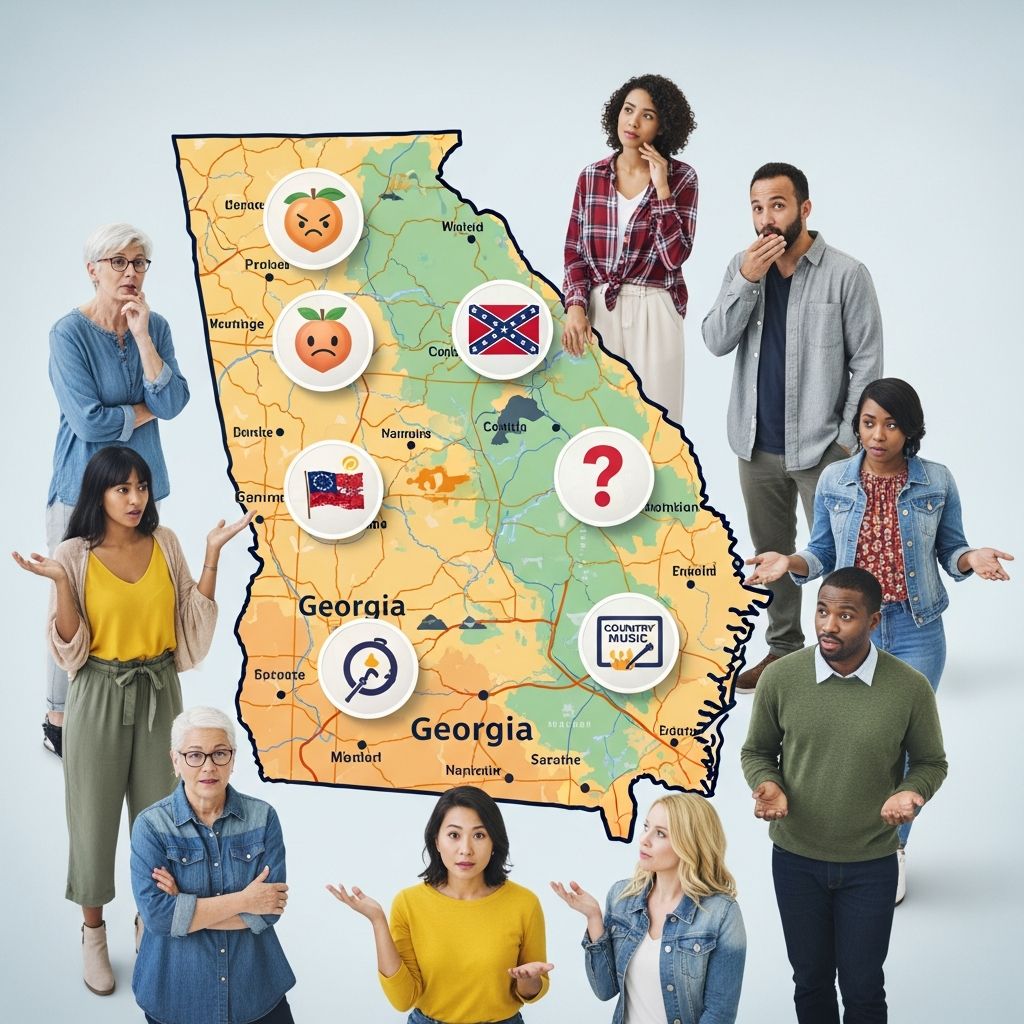8 Things You Should Never Say to Someone from Georgia
Learn what topics to avoid when speaking with Georgians to ensure respectful conversations.

Georgia, nestled between Europe and Asia, is a country rich in history, culture, and tradition. Georgians are known for their exceptional hospitality, warmth, and passion. However, like any culture, there are certain topics and phrases that can quickly derail a conversation or deeply offend. Whether you’re planning a visit to this stunning country or simply want to interact respectfully with Georgians, understanding what not to say is just as important as knowing what to do. This guide explores eight things you should never say to someone from Georgia, helping you navigate conversations with cultural awareness and sensitivity.
1. Confusing Georgia with the U.S. State
One of the most common—and most tiresome—mistakes visitors make is confusing Georgia the country with Georgia the American state. Georgians have heard jokes like “Where’s Atlanta?” far too many times, and they’re not amused. Georgia has a distinct national identity that spans thousands of years, with its own language, alphabet, traditions, and heritage that predate the United States by centuries.
When you joke about this confusion, you’re essentially dismissing an entire nation’s cultural identity. Georgians take tremendous pride in their country and its place in world history. The best approach is to educate yourself about Georgia’s rich history before engaging with locals. Learn about the ancient Kingdom of Georgia, its role in the Silk Road, and its unique contributions to world civilization. This respect will be immediately recognized and appreciated, opening doors to deeper conversations about Georgian culture.
2. Making Light of Stalin’s Legacy
Stalin’s legacy remains one of the most sensitive and divisive topics in Georgia. While Stalin was born in the Georgian city of Gori, his brutal regime caused immense suffering, and the subject carries complex emotions for many Georgians. Making casual jokes or light comments about Stalin, communism, or this dark period in history can deeply offend.
Different Georgians have different perspectives on Stalin depending on their historical viewpoint and generational background. Some view him as a historical figure, while others see him as a tyrant responsible for immense suffering. Rather than offering your opinions or making jokes, let locals lead the conversation if they choose to discuss this topic. Approach any discussion with quiet curiosity and genuine interest, allowing Georgians to share their perspectives without judgment. This demonstrates respect for their history and emotions.
3. Questioning Georgian Cuisine or Heritage
Georgian food and wine are not merely meals—they are expressions of national identity and pride. The country boasts one of the world’s oldest wine-making traditions, with over 8,000 years of winemaking history. Georgian cuisine, with its distinctive flavors and preparation methods, is central to the culture and represents generations of culinary tradition.
Never question the authenticity of Georgian dishes, suggest that Georgian cuisine resembles that of neighboring countries, or imply that other cuisines are superior. Such comments are taken as personal insults rather than innocent observations. When dining with Georgians, celebrate what you’re served and express genuine appreciation. Ask questions about the preparation and history of dishes to show interest and respect. Praise, not comparison, is the appropriate response to Georgian hospitality and culinary tradition.
4. Making Disparaging Comments About Georgian Language or Culture
The Georgian language is one of the world’s most unique linguistic systems, featuring its own alphabet that dates back approximately 1,500 years. It’s a source of immense cultural pride, and the language itself is considered a cornerstone of Georgian identity. Similarly, Georgian traditions, customs, and cultural practices are deeply cherished and form the backbone of national identity.
Never make jokes about the difficulty of the Georgian language, dismiss Georgian cultural practices as outdated, or suggest that other cultures are more sophisticated. Such comments undermine the very foundation of what makes Georgia distinct. Instead, show genuine interest in learning basic Georgian phrases, understanding traditional customs, and appreciating the unique aspects of Georgian culture. This respect will foster positive interactions and deepen your understanding of the country.
5. Assuming All Georgians Are Wealthy or Making Class-Based Generalizations
Georgia is a developing nation with varying levels of economic development across different regions. Making assumptions about someone’s wealth based on stereotypes or generalizing about economic status can be offensive. Additionally, avoid making jokes about poverty or suggesting that Georgia is less developed than Western countries as though it’s inherently inferior.
Georgians are proud of their progress and achievements despite economic challenges. Treat all individuals with equal respect regardless of their perceived economic status, and avoid making economic comparisons that could be seen as disparaging. Focus on the country’s strengths—its history, culture, resilience, and the warmth of its people—rather than economic metrics.
6. Using Derogatory Language or Swearing in Public
Georgian culture places great emphasis on politeness and respectful communication. Swearing in public or using crude language is not just frowned upon—it can deeply offend, especially around women or elders. Even if you hear young locals using casual slang or mild profanities, as a visitor, you’re held to a higher standard of politeness and respect.
Clean, respectful language demonstrates cultural awareness and earns goodwill quickly. Georgians appreciate visitors who make the effort to communicate respectfully and considerately. Avoiding profanity also shows respect for the country’s conservative values and traditional emphasis on propriety in public spaces.
7. Making Negative Comments About Religious Faith
Religion runs deep in Georgia’s identity. The country is predominantly Orthodox Christian, and the Georgian Orthodox Church has been central to Georgian culture for nearly 1,700 years. Using God’s name flippantly, joking about religion, or making disparaging comments about religious faith is considered rude and deeply offensive.
When visiting churches or monasteries, treat these spaces with appropriate reverence. Dress modestly, cover your shoulders and knees, and follow all posted or verbally communicated rules. Maintain quiet behavior, show respect to religious objects and imagery, and avoid taking photographs without explicit permission. Religion isn’t just a personal belief in Georgia—it’s woven into the national fabric and identity of the nation.
8. Making Political Statements or Criticizing Georgian Politics
Georgia’s political landscape is complex, influenced by its historical experiences and geopolitical position. Georgians can disagree passionately among themselves about politics, but having a foreign visitor critique Georgian politics or make sweeping political statements can be seen as inappropriate interference.
Additionally, avoid commenting negatively on territorial disputes or suggesting that Georgia should align with specific international powers. These are sensitive matters that involve national sovereignty and historical trauma. If locals bring up political topics, listen respectfully and ask clarifying questions rather than offering strong opinions or criticism. This approach demonstrates respect for Georgia’s autonomy and complex political situation.
Understanding Georgian Communication Style
To avoid saying offensive things to Georgians, it helps to understand their communication style. Georgians are known for being expressive, passionate, and direct. They value authenticity and appreciate people who engage honestly with them. However, this directness should never come across as disrespect or rudeness.
When communicating with Georgians, maintain eye contact, speak with genuine interest, and show that you’ve made an effort to understand their culture. Ask questions about their traditions, history, and way of life. This curiosity is appreciated and can turn casual conversations into meaningful cultural exchanges.
Best Practices for Respectful Conversation
When interacting with Georgians, follow these guidelines to ensure your conversations remain respectful and positive:
Listen More Than You Speak: Allow Georgians to share their perspectives, stories, and experiences. Genuine listening demonstrates respect and interest in their viewpoint.
Show Cultural Interest: Ask questions about Georgian history, traditions, food, and customs. This demonstrates that you value their culture and are willing to learn.
Avoid Generalizations: Treat each person as an individual rather than a representative of their country. Not all Georgians hold identical views or practices.
Acknowledge Historical Complexity: When historical topics arise, recognize that Georgia’s history is complex and that Georgians may hold diverse perspectives on historical events.
Show Appreciation: Whether it’s for hospitality, food, or cultural traditions, genuine appreciation and gratitude go a long way in building positive relationships.
The Importance of Cultural Sensitivity
Understanding what not to say to Georgians reflects a broader commitment to cultural sensitivity and respect. When you travel to a country or interact with people from a different culture, you’re a guest in their space. This guest status comes with certain responsibilities and expectations.
By avoiding these eight topics and phrases, you’re not just preventing potential offense—you’re demonstrating genuine respect for Georgian culture, history, and identity. This respect creates the foundation for meaningful interactions, deeper friendships, and richer cultural experiences. Georgians are renowned for their hospitality and warmth, and when they see that visitors reciprocate with respect and genuine interest, they open their hearts and homes even more generously.
Learning Basic Georgian Phrases
One excellent way to show respect is to learn a few basic Georgian phrases. Georgians deeply appreciate when visitors make an effort to speak their language, even if it’s just a few words. Here are some useful phrases:
Gamarjoba (Hello)
Madloba (Thank you)
Shen karga xar (You’re nice)
Kartul shen laparaki (Do you speak Georgian?)
Alvidleba (Goodbye)
Making this effort demonstrates humility and genuine interest in Georgian culture, which Georgians find endearing and respectful.
Frequently Asked Questions
Q: Is it okay to discuss politics with Georgians?
A: While Georgians discuss politics among themselves, visitors should listen respectfully rather than offer strong opinions or criticism. Let locals lead political conversations and avoid making sweeping statements about Georgian governance or geopolitical matters.
Q: Can I take photographs inside Georgian churches?
A: Always ask for permission before taking photographs inside churches or monasteries. Many religious sites restrict photography to show respect and maintain the sanctity of the space. Follow all posted regulations and respect the wishes of religious authorities.
Q: What if I accidentally say something offensive?
A: If you realize you’ve said something potentially offensive, apologize sincerely and explain that you were unaware of the sensitivity. Most Georgians appreciate genuine apologies and efforts to understand their culture better. Use it as a learning opportunity.
Q: Are there topics that are universally safe to discuss with Georgians?
A: Yes! Georgians generally enjoy discussing nature, tourism, sports (especially football), their beautiful landscapes, traditional crafts, and personal experiences. These neutral topics often lead to warm, positive conversations.
Q: How formal should I be when meeting Georgians?
A: While Georgian business culture is less formal than in some countries, showing initial respect through formal greetings and addressing elders respectfully is important. As relationships develop, interactions may become more casual and friendly.
Conclusion
Traveling to Georgia or interacting with Georgians is a wonderful opportunity to experience a rich, unique culture. By understanding these eight topics to avoid, you’re taking an important step toward building positive relationships and meaningful cultural exchanges. Remember that Georgians are warm, generous, and hospitable people who appreciate visitors who show genuine respect and interest in their country. Approach conversations with curiosity, listen actively, and express appreciation for Georgian traditions, and you’ll find that the Georgian people are equally welcoming and eager to share their remarkable culture with you.
References
- https://georgia.to/en/language-and-etiquette/
- https://blog.onevasco.com/things-not-to-do-while-traveling/georgia
- https://www.caucasus-trekking.com/general/manners
- https://explorege.com/en/posts/dos-and-donts-when-traveling-in-georgia-cultural-etiquette-guide
- https://georgianjournal.ge/business/6469-business-etiquette-and-customs-in-georgia-.html
- https://georgia.to/en/travel-tips/cultural-insights/
- https://www.lonelyplanet.com/articles/things-to-know-before-traveling-to-georgia-europe












